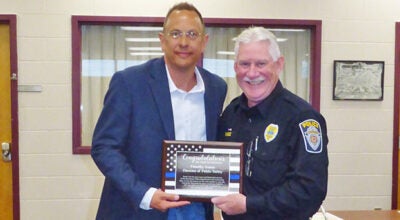MSU ‘redesign’ affects more than 4-H
Published 4:12 pm Sunday, March 20, 2011

CASSOPOLIS — Brad Neumann, Michigan State University Extension (MSUE) district coordinator for Cass and other counties, came calling Thursday night to review with the Board of Commissioners two separate issues.
First was an overview of MSU Extension’s “redesign” and the new “framework.”
Second, “We have a collateral issue that’s come up in the last couple of months that has a bearing on this,” departing Interim Administrator Chuck Clarke explained. “Our 4-H representative (Jessica Poulsen) left and we have to fill that position. That has long-term financial implications because that’s no longer going to be funded 60-40, it’s going to be funded 100-percent by the county. There are several options the county has and we need to resolve that,” which was done with an 8-5 vote to retain a fulltime 4-H youth educator rather than going with a half-time paraprofessional.
In 2009, 20th MSU President Lou Anna K. Simon charged Extension with creating the service needed for the 21st century: still tied to economic development, jobs and health; still committed to translating research findings into practice; and how that service should be organized and delivered in the 21st century.
“The recent redesign of MSUE is a direct result of that charge,” Neumann said. “We’ve reduced administrative costs through elimination of county director positions and our regional offices. We’ve streamlined financial, human resources and information technology systems on the campus of Michigan State University. We’re an organization with greater use of technology to reach new audiences and to reduce our operating costs. We’re an organization with greater flexibility in our program coverage, with all of our programs available to residents, wherever they might be located in the state of Michigan. And we’re also an organization with educators assigned to more specialized roles that fit into four new programmatic institutes: agriculture and agribusiness; greening Michigan, which focuses on using education to help communities leverage Michigan’s natural and human assets for prosperity; health and nutrition, focused on helping people manage and improve their own health; and children and youth, where the 4-H program is housed. That institute is focused on equipping Michigan’s workforce for the future.”
Neumann coordinates a district of Berrien, Branch, Calhoun, Cass, Kalamazoo, St. Joseph and Van Buren counties from Hickory Corners.
Neumann said of educators’ more specialized roles, “We’ve seen the need to proceed in that manner because industry has become more specialized. Many of the challenges our communities face have become more complex. As an educational institution, educators are out there working with agriculture or working with communities on economic development.
“Of course, budgets don’t allow us to have a specialist in each of these four program areas in every county, so our specialized educators have the need to move across county lines as they do their educational programming. With that specialization, comes the need to re-evaluate our operation. Cass County, of course, currently provides travel budgets for staff in the office. (Former county director) Dan Rajzer, for example, is an agriculture educator with a greater charge to become more specialized in handling wheat control issues within field crops around southwest Michigan. So, in the future, who would pay for Dan’s travel? Cass? St. Joseph County? Kalamazoo County? Our operating support structure doesn’t quite align with our new programmatic structure. This is precisely the reason for the concept of a standardized memorandum of agreement (MOA) which sets forth a framework detailing what the County of Cass is expected to bring to the table and also what MSU Extension is to bring to the table to encourage greater growth of our partnership, which has lasted over many years.”
To standardize county contributions, Cass would be assessed a fixed amount ($31,000), plus a variable amount (30 cents per capita) based on 2009 estimates.
Cass County also agrees to provide office space to house at least one Extension educator, one 4-H program coordinator, access to educational space for delivery of Extension programs, utilities and telephone support and access to high-speed Internet.
Also, Cass County is responsible for clerical support staff to assist county residents in accessing MSUE resources by walk-in traffic, telephone, e-mail, Internet and other media and to provide clerical support to the program staff.
MSUE agrees to provide access to programs of all four institutes to county residents, including access to educators appointed to the institutes and MSU faculty affiliated with each institute.
MSUE provides funding for salaries and benefits of educators and faculty sufficient to deliver the core program priorities of each institute.
MSUE assigns a minimum of one Extension educator to be housed in the county office, with more as agreed to between MSUE and the county. MSUE supervises the educator, 4-H program coordinator, faculty who provide programming to residents in the county and of county support staff assigned to the county Extension office, if the county desires.
MSUE reports on an annual basis the number of individuals served programs in the county and the impact of programs delivered.
“This is in my words,” said Neumann. “By mid-April I will have an actual legal document I will provide. In May, perhaps, or June, I would be more than happy to come back and answer specific questions.”
Neumann also reviewed with commissioners a spreadsheet highlighting differences between the $145,991 2011 budget and the $168,044 2012 MOA.
“Currently, the county is funding 60 percent of the cost of the 4-H educator, a professional-level position. In 2012, we do ask that the county fund 100-percent of a lower-cost instructor, a paraprofessional position,” Neumann said. “The difference between the two rows is approximately $22,000. We are prepared to offset that expense through the sharing of support staff with another county department,” Parks and Recreation.
“My presentation is for your information only at this time. I want to further engage Cass County in discussions around the standardized MOA. The total cost of that (4-H) position for a fulltime equivalent is estimated at $55,000 for salary, fringe and operating. Part-time would be half that,” $27,500.
Clarke said historically there has been “high turnover” in the 4-H position, with “2 1/2 years the average over the last 50 years.”
“When you look at our assets in Cass County,” Commissioner Ed Goodman, R-Silver Creek Township, said, “it’s agriculture. If we can’t support that 100-percent, I think we’d be remiss.”






